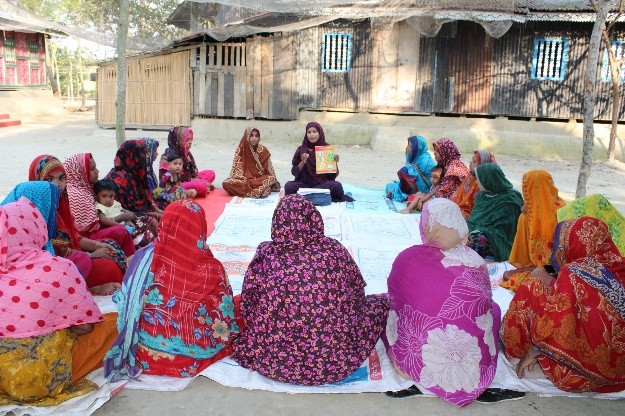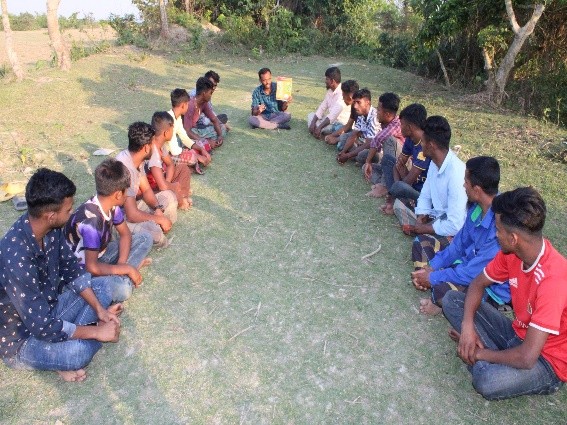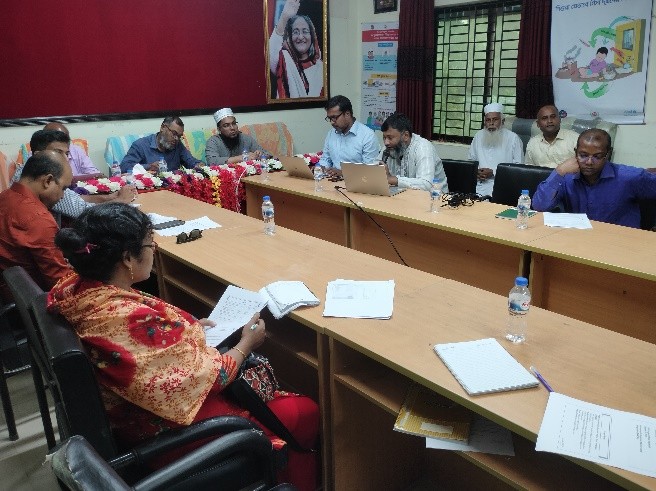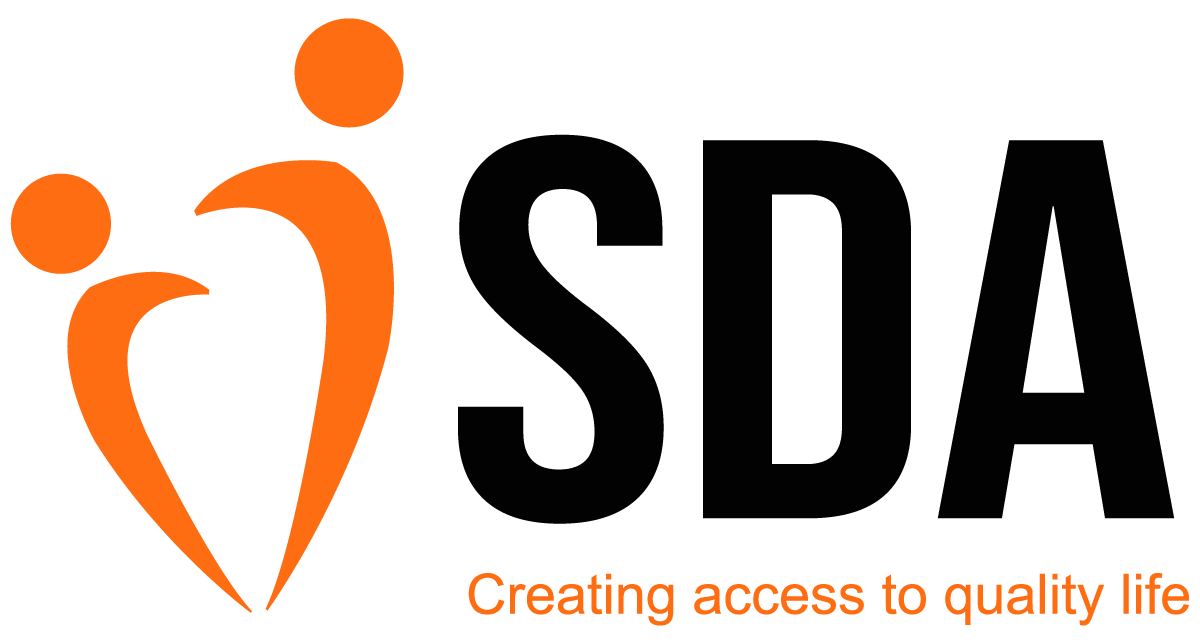1. Right to Grow (U5 Children Nutrition Advocacy Spport)
Project in Brief: Right2Grow is a strategic partnership among Action Against Hunger, the Center for Economic Governance and Accountability Africa (CEGAA), Max Foundation, Save the Children and World Vision. Funded by the Dutch Government (Civil Society Strengthening –Power of Voices), Right2Grow will collaborate with communities, Community Based Organizations (CBOs) in Bangladesh, Burkina Faso, Ethiopia, Mali, South Sudan and Uganda with a duration from 2021 to 2025. In Bangladesh the consortium lead is Max Foundation and their implementing partner is Society Development Agency (SDA) working since February 2022. The project is based in following grounds – despite a number of improvement factor, the problem still persist in nutritional improvement as well as health and hygiene problem among the poor and poorest communities. Bangladesh is one of the high-risk countries facing malnutrition, lack of proper wash practices and inadequate access to health care services. There are many underlying causes of malnutrition including lack of maternal care and education, limited access to information on nutrition in both rural and urban context. Child marriage and premature early birth, lack of sanitation and hand-washing practices, limited access to food and health care, feeding practices of infant and young children as well gender inequality with lack of rights and inclusion.
Under nutrition is estimated to be the main underlying factor in 45% of all deaths among children under five years and in this regard Bangladesh is one of the top according to Global Hunger Index 2019, BD is holding top 5 position. Without nutritional improvement it’s not possible to ensure a child’s well-being. The Right2Grow started its journey with consortium and implementing partner to reduce under nutrition and is aim to establishing a community based monitoring system.
The Goal of the project:
‘Every child is able to reach their full potential’,
Long term impact:-
All children under 5 are well nourished and Decision makers jointly and effectively address under-nutrition in a multi-sectoral, gender-sensitive and inclusive way, as mid-term impact.
The outcomes of the project are-
- Communities demand and invest in basic social services and adopt good nutrition, WASH and Mother/Child health care practices, jointly addressing barriers with private sector partners;
- Representative and empowered civil society organizations (CSOs) effectively navigate the civic space to advocate for leadership and good governance to prevent under nutrition;
- National government and decentralized entities adopt and mainstream an integrated, multi-sectoral approach to under nutrition in policies, action plans and budget allocations; d. Donors and international development actors coordinate and collaborate along the humanitarian-development nexus to address the underlying determinants of under nutrition.
Major Activities in broader scale are- 1. Community capacity building and awareness on WASH, Nutrition rights and primary health care. 2. Capacity building of local community leaders and LEAS as WASH nutrition and community health. 3. Capacity Development of local micro-entrepreneurs, particularity potential women. 4. Sensitized LGI representatives, community participatory monitoring, local level policy dialogue, national level workshop, evidence based research etc.
The Project is implementing in 2 Sub-districts (14 UPS) under Patuakhali District.
Major Achievements (continued)
The Project achieved as-
a. Number Under five Children Height Weight measurement- 13,404 Children b. Child (U5) nutrition support for hardcore poor -592 (Advocacy), Total Active CSOs- 378, Height Weight Machine provided- 06 Community Clinic (CC) (Advocacy), Maxi Basin/ Hand washing basin provided-93, Toilet functioning support- 87 and Union Parishad (UP) Child Nutrition Budget increased 58.55% than the previous year- (Note: 2023- 97,74,982 BDT & 2024-1,66,92632 BDT). Besides District and Upazilla (Sub-District) level advocacy event held with the present of Local Member of the Parliament.
Program Pictures:
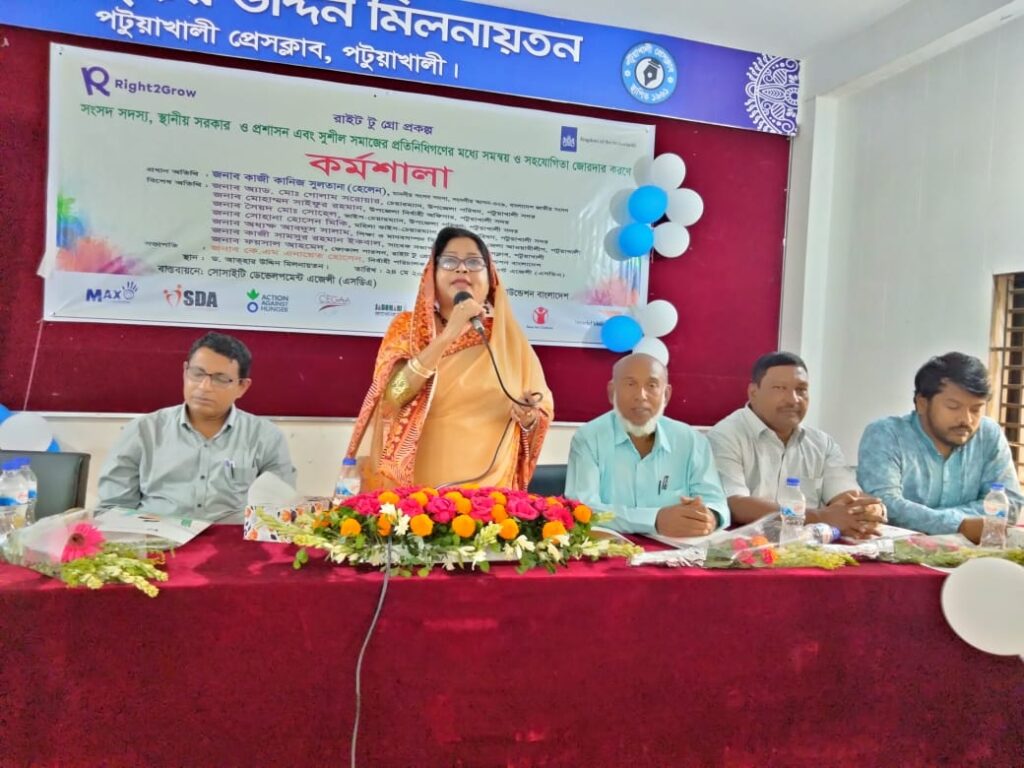
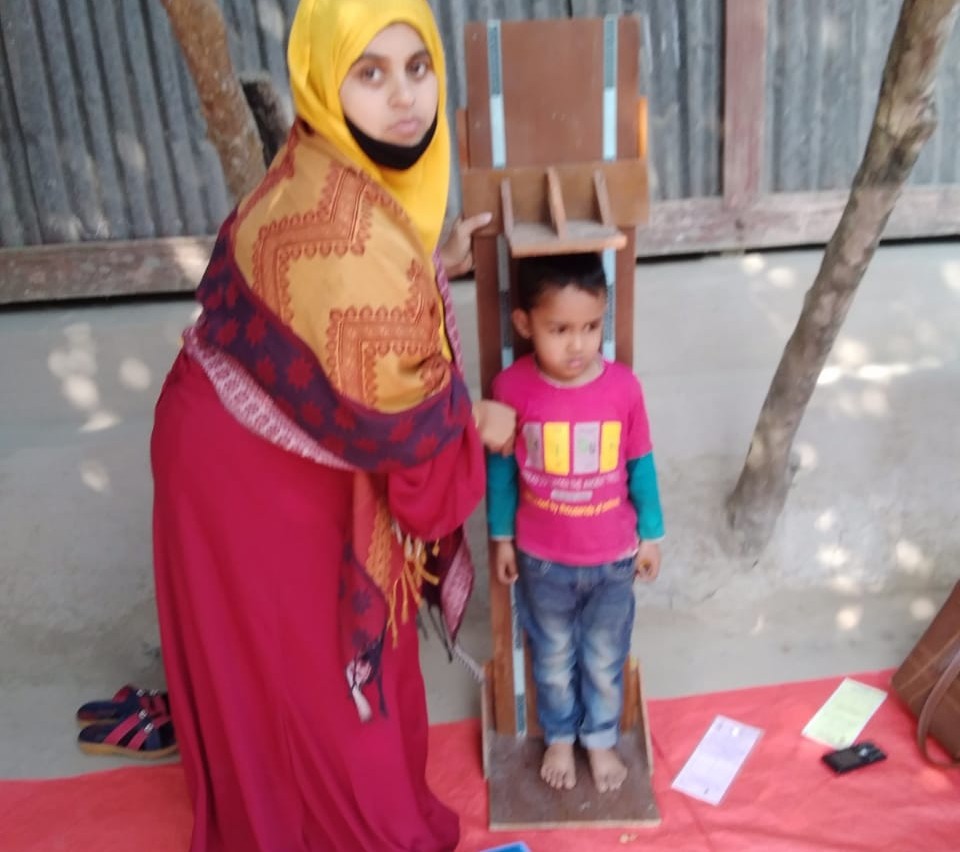
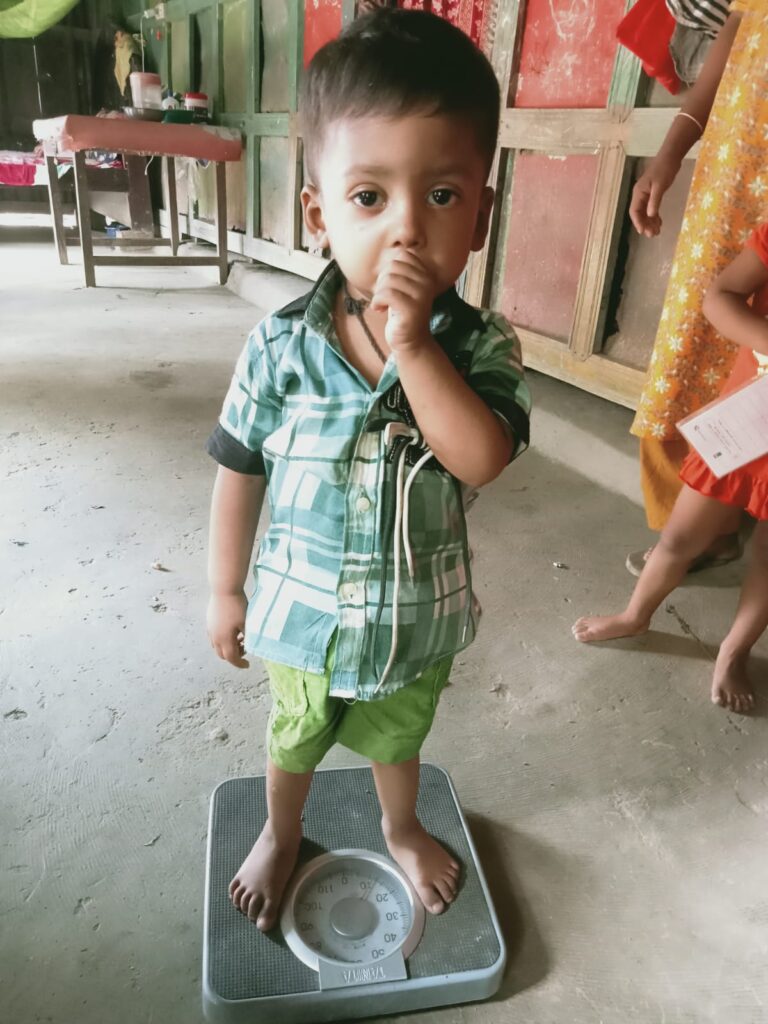
2. WASH & Biogas as an Alternative Energy Source for Communities –Phase-III
Project in Brief:
Bangladesh one of the densely populated country facing difficulties in waste management and reuse of it. Human waste contaminates environment and are risk of health issues. On the other hand if human waste and animal waste like cow dung can be used in renewable energy including safe fuel for consumption. The 8th Five Year Plan of Bangladesh has outlined the issues under Chapter 8 titled “Improved Waste Management and Introduction of Circular Economy”. Under the head 8.4.6 it is clearly articulated as “Waste can be utilized as resource. It also considered as a great source of environmental pollution if not properly managed” “Government support such as capacity building, incentives, creating a market through bridging the supply and demand might be required for initiating recycling, waste to compost/biogas as well as energy project. Government 8th Fifth-year plan will focus on the fruitful application of the improved waste management and introduction of circular economy for sustainable use of resources.” In Sustainable Development Goal (SDG) 12.4 clearly mentioned that “By 2020, achieve the environmentally sound management of chemicals and all wastes throughout their life cycle, in accordance with agreed international frameworks, and significantly reduce their release to air, water and soil in order to minimize their adverse impacts on human health and the environment. This actually inspired us to work for waste management creates safe scope of renewable fuel consumption. More benefit will be found as community participation as well built their skill of own management of Biogas Plant.
The comprehensive Clean Energy and WASH support project will improve energy efficiency of vulnerable rural communities in Bangladesh. With the financial support from Community Partners International (CPI), Society Development Agency (SDA) is playing a catalytic role in directly impacting the lives of people through construction of biogas plant, installation of mini pipe water supply system, construction of environment friendly sanitary latrines and developing local knowledge and capacity. The project will be implemented with a duration of 12 (twelve) months with yearly continuation in Patuakhali Sadar Upazilla (Sub-district) of Patuakhali districts under Barisal Division. This project will be jointly managed and implemented by CPI and SDA. For sustainability, this project will build community ownership through forming operation and maintenance committee, capacity building and strengthening their networking through User groups or Management Committees.
Rational of the project: Biogas is the mixture of gases produced by the breakdown of organic matter in the absence of oxygen (anaerobically), primarily consisting of methane and carbon dioxide. It mainly comprises of hydro-carbon which is combustible and can produce heat and energy when burnt. Bio-gas is produced through a bio-chemical process in which certain types of bacteria convert the biological wastes into useful bio-gas. Since the useful gas originates from biological process, it has been termed as bio-gas. Methane gas is the main constituent of biogas.
This project will not only fulfill the demand of gas of low income rural families but will also protect the environment from pollution. All the hazardous organic materials which basically pollute the environment will be used as feeding materials of the plants. On the other hand, these organic wastages will turn into organic fertilizer. Each plant capacity is approximately 4m3 and also produces organic fertilizer, which will help the agricultural and fisheries sector of project area. This project will reduce dependency on traditional fossil fuels as 1cubic meter biogas is equivalent to 3.474 kg of firewood’s or 4.698 kWh of electricity. There is some misconception about biogas that fixed dome occupies a huge amount of space and as the gas is produced from wastages, it has unbearable odder. Nevertheless, we will build the domes underground so they will not occupy upper spaces and for the same reason why will not spread any odder. Fecal sludge oriented Bio gas plant also another mechanism for fecal sludge management and also gives us nutrient rich slurry that can be used for crop production.
On the other hand, this project also fulfill the demand of safe water of rural most water vulnerable families. The demand for clean water in various climate vulnerable areas such as Bangladesh’s coastal region like Patuakhali is high. While the country has made progress in ensuring access to more water sources, access to safe drinking water sources is relatively low. Water is absolutely the most necessary commodity for the sub-stance and wellbeing for mankind. Most of the available sources of fresh water are lies underground Bangladesh. With the ever-increasing demand of water, the importance of utilization of water is increasing at an accelerated rate throughout the world. Arsenic contamination of ground water has appeared to be a serious public health problem in Bangladesh. It has caused increasing concern due to likely health impacts on a large population inhabiting one of the poorest countries of the world; a population which is mostly rural, and whose life style and livelihood are dominated by the influence of water. Environmental pollution, saltwater intrusion, groundwater abstraction is some of the main problems that affect water quality in the country. This project can efficiently provide safe water to the rural vulnerable beneficiaries.
In Patuakhali Sador Upazila, last REMAL Cyclone has created a negative impact on sanitation system especially latrines. Due to high tide and long stability of cyclone mostly destroyed sanitary latrines as well submerged by flood water and whole system destroyed and make environment worsen. Though comparatively rich community manage and rebuild or repaired their own but a number of family unable to do that. The project is intended to address these issue providing sanitary latrines for need based and more neighbor adjacent community hygiene issues improvement as well, for more hygiene support, sanitation kits will be provided to address specific community needs.
The objectives of the project are– a. Reducing dependency on LP gas and producing organic fertilizer. b. Saving time and cost with reducing carbon emission and Safe waste management. c. Community Partnership and ownership developed d. Develop eco-friendly energy source where raw materials for bio gas plant are available in locally
Project key activities are –
- Biogas Plant
(i) Construction of one biogas plant in community level with community owned and led functional capacity (ii) Operation and maintenance of Biogas plant (iii) Capacity building training on operation & maintenance to biogas user group.
- WASH support activities are-
(i) Installation of One Mini pipe water supply system with borehole and elevated water reservoir tank (ii) Installation of deep tube-well with platform and waste water disposal system (iii) Formation & Orientation on O &M of Mini pipe water supply system committee (iv) Operation and Maintenance of Mini pipe water supply system (v) Training on Water Safety Plan to water user group. In addition for ensuring safe sanitation this project will construct a number of sanitary latrines and provide hygiene and sanitation knowledge and kits. Only user group members are eligible for the hygiene and sanitation kits and gradually it will expand.
Achievements (Continued)
- Biogas plant Installation -05
- Mini pipe water plant -01 (overhead tank 10000 L & Pipe connections)
- Safe Pipe Water supply 120 family ( 600 member)
- Establishment of Community Deep Tube-well- 05 ( 75 family)
Program Pictures:
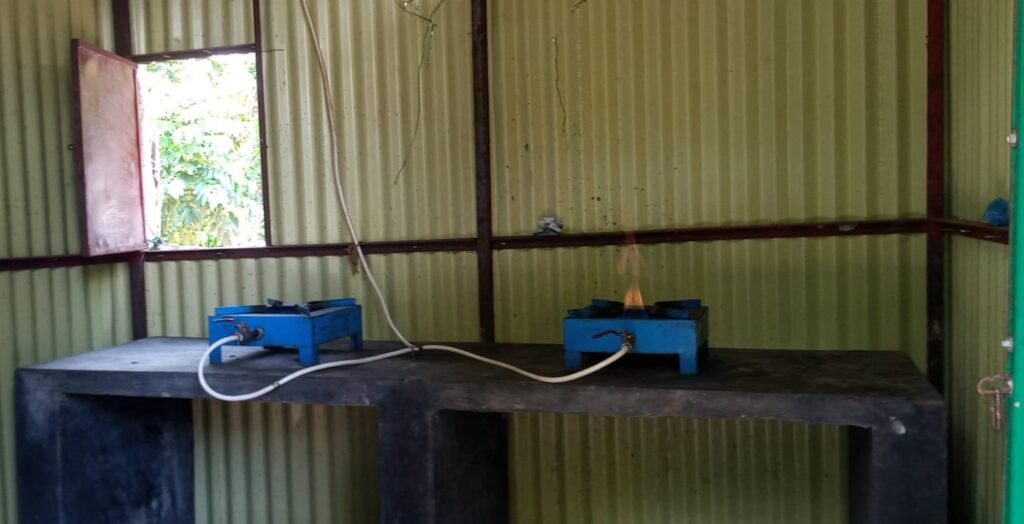
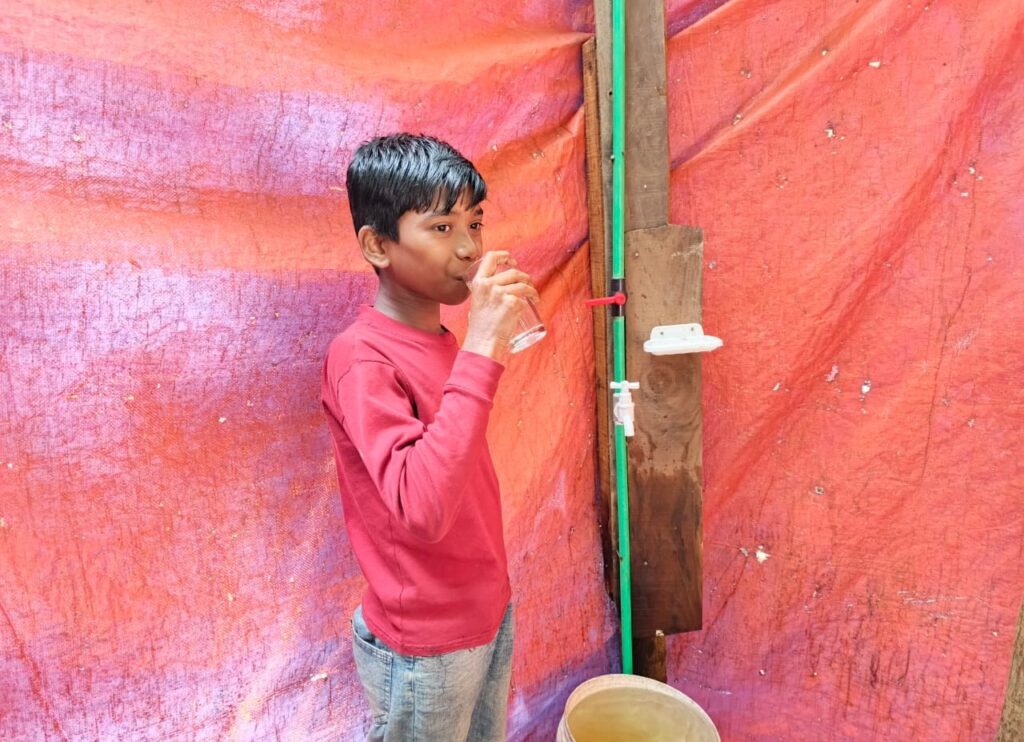
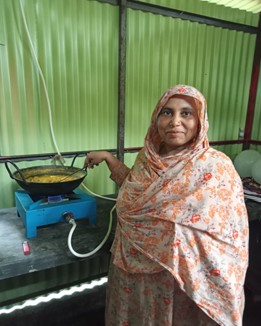
3. Computer Literacy Program (Digital Skill Development) Dhaka
Project in Brief:
SDA is implementing the project titled, ‘Computer Literacy Program for Underprivileged Youth in Bangladesh (CLP)’. Under the project- maintaining Computer Literacy Centers (CLC), establishing new CLC, Smart Classroom (SCR), distance teaching enable Smart Classroom, promote remote volunteer teaching by volunteers. Implementing Education through Entertainment, Connect Students around the World (CSAW) will be implemented. Under the thematic area Education and ICT, the project is a core example of digital education using modern techniques and tools. The project is supported by a veteran group of USA Based Scholars charity fund using experiential learning through guidance. Not only guiding but, exception visual communication and learning between USA and Bangladesh students happen with tremendous learning. The project has large geographical coverage covering 37 districts One hundred plus schools with contentious learning mechanisms.
Rational of the Project:
In today’s information age, computer literacy is a must for students and youth of a society. We are passing the 21st-century era and entering the 4th industrial revolution, but the digital divide is existing and, in some cases, it is creasing and widening. The government of Bangladesh is trying to build the country as a digital Bangladesh. The government cannot do it alone, everyone must come forward to achieve this goal. Various non-governmental and private organizations have come forward to build the digital Bangladesh.
CLP-USA initiated the Computer Literacy Program (CLP) in 2004. Over the years CLP established Computer Literacy Centers (CLCs) and Smart Classrooms (SCRs), developed and adapted digital education materials, spawned innovative programs, trained teachers, and introduced thousands of students to computers, multi-media, and digital lessons.
Major focus of the programs are
- Establishing CLCs, SCRs, Distance Teaching enables Classrooms in various schools across the country. b. Spreading out Education through Entertainment program all across the country applying new approach and methods. C. Implement Expert Guided Learning (EGL) Program in hundreds schools. d. Continuation of Training and refreshers’ training for the teachers through applying a different approach. i.e. blended learning approach. E. Facilitating the schools to replace outdated equipment. F. Providing technical (hardware, software, and Internet) support. G. Mentoring teachers. H. Ensuring the participation of students, teachers, and parents in various online and offline skills learning programs. i. Monitoring, and evaluation. J. Maintaining CLP website clpweb.org
The Goal of the project is-Empowering underprivileged youths through computer literacy training and technology-aided education, followed with three outcomes as –
- 75% of trained teachers showed improved skills on basic computer skills and eLearning tools
- 75% of trained teachers participated in conducting the smart classroom activities to achieve subject-based learning objectives.
- 75% of trained students improved skills on basic computer and usage of eLearning tools.
Major activities of the project are:
a. Established 5 Computer Literacy Centers (CLC) to facilitate students for learning computers basics by February 2024 b. Establish 5 Smart Classrooms (SCR) to aid teachers in teaching with visual materials, and facilitate students to learn complicated topics by March 2024. C. Replaced 15 CPUs, 15 UPS, 15 monitors, and 5 Laptops in the existing Computer Literacy Centers (CLC) by March 2024. d. Provided technical support on hardware, software, and internet-related issues to 100 schools throughout the project year. Several Capacity building events are organized under this project-
1. Provided 2 days on the job face to face Training of Trainers (TOT) on basic computer skills to 5 computer teachers (per school 1 teacher) by February 2024. 2. Provided 5 days subject based virtual training to 20 subject-based teachers (per school 4 teachers) by March 2024. 3. Provided 1 day virtual refresher training on eLearning tools to 100 teachers (per school 1 teacher) by March 2024. 4. Trained 3,000 students (50% girls) on basic computer skills at CLP supported schools by the trained teachers within April 2024. 5. Organized students training on basic computer skills at non-CLP schools: 180 students (50% girls) by April 2024.
Achievement of the project in the reporting period are–
- Digital Education (Computer training provided) in 105 High Schools. Total Students=6375 ( Female-3654 & Male-2721)
- Incentive provided to Teacher-105 teachers
Computer Literacy Center(CLC) Established=10 (schools) with 4 Laptop, 01 Desktop, 01 Printer and Wifi-connection support
Program Pictures:
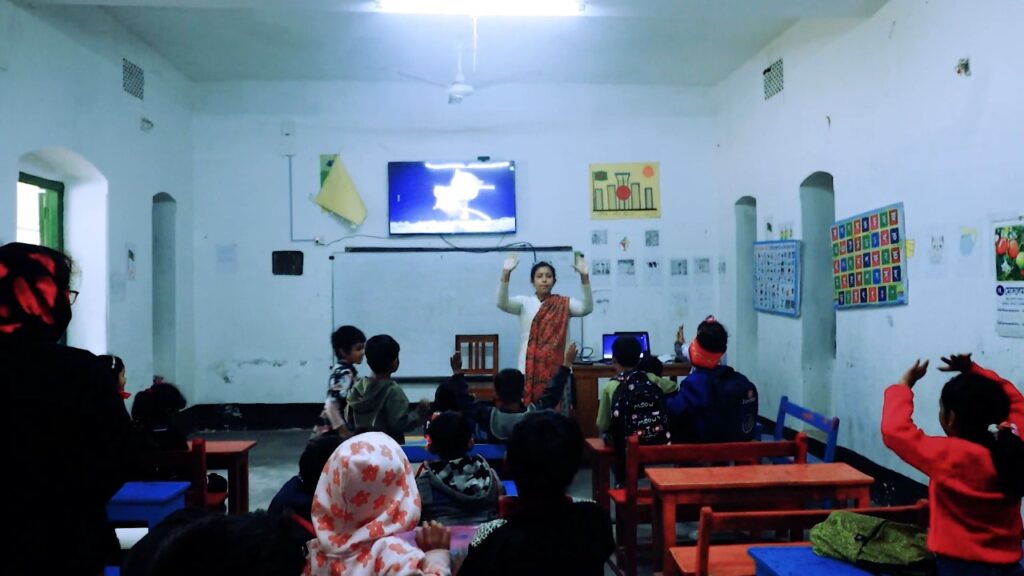
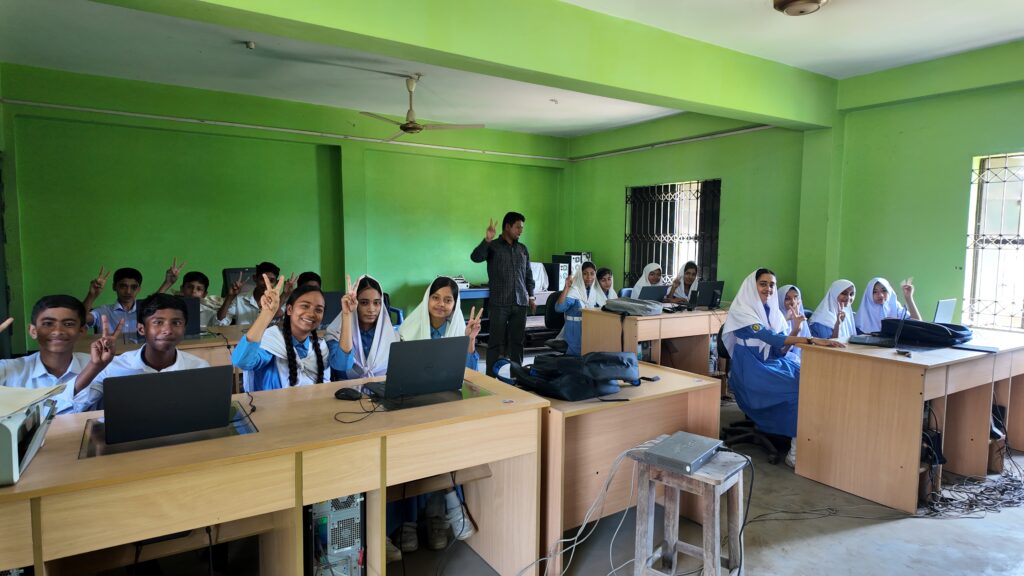
4. ‘‘Capacity Development for Sustainable and Independent Management of WASH facilities in urban poor-2” (CDSIM WASH UP-2)
Project in Brief: SDA is implementing the project titled ‘‘Capacity Development for Sustainable and Independent Management of WASH facilities in urban poor-2” (CDSIM WASH UP-2) a Japanese donor funded by Japan Fund for Global Environment (JFGE) and partnership with Japan Association of Drainage and Environment ( JADE). Basically this is an urban based WASH program focusing slum community WASH behavior health and sanitation management by themselves.
Rational of the Project:
Bangladesh is one of the role model of development and developed in education, health, living standard and actually in every segment of life. Government is trying its utmost, to cope up with 21 Centuries advancement as a healthy nation. To achieve the SDGs our advancement is notable and contribution in different sector like health and WASH required more effort in urban slum areas as situation is different there.
In Bangladesh, urban slum problem is critical in some aspects, especially in health and WASH. Internal migration and displacement of climate and disaster vulnerable especially river erosion and rural poverty. According to slum census 2014, total number of slum dwellers are
2.23 Million and seventy percent of them, lived in Big cities like Dhaka, Khulna, Chittagong, Barishal and adjacent to industrial and business areas with eager to work as assistant or day labor and Some other alternates like – Rickshaw pulling, waste collection, domestic work, small business or hawker. As there is no alternative living, they live very densely slum areas in wretched condition or inhuman living. No health education, WASH facilities, nutrition are full filled especially sewerage management, Safe Water, bas smell and very dense wash facilities make their life unbearable.
The cities of coastal Bangladesh, like Khulna, Patuakhali etc. have same nature in urban slum areas especially access to safe water in drink and household uses, if somewhere is available to water but access is difficult. Due to supply and management, managing sanitation is difficult to most of slum dwellers. Besides, due to ground water level down, situation worsen and out of control in a sense. This also contaminated environment as no safety toilet and household wash facilities are there as a result communicable diseases increased. There are some facilities developed earlier by other NGOs but there is no running water and community can’t use those independently due to their management capacity. The project is affirm to solve these problems through community engagement leadership.
Major Focus program:
The goal of the project is to provide sustainable and healthy community through sanitation behavior change and practice. WASH cluster core pipeline management and availability of safe water for WASH and household uses with sustainability.
Major Activities under the project are-
Target community selection and survey, Community level hygiene behavior and community level problem solving and decision making; Self-identified problem solution and community decided and required reconstruction/repair of existing WASH facilities. WASH management committee and CBO reform and reconstruction. WASH management process take-care, monitoring and follow-up. Some Achievements facts and figures:
Under Khulna City Corporation (KCC) 03 Wards (16, 18 & 22), 07 slum areas-
- Community Toilet repair/reconstruction-18 Units
- Establish Shallow Tube-well-02 no,
- Deep Tube-well with submersible pump-01
- Water supply Motor-06 unit & Basin-07 unit
- Total Beneficiary Family-260 family
Program Pictures:
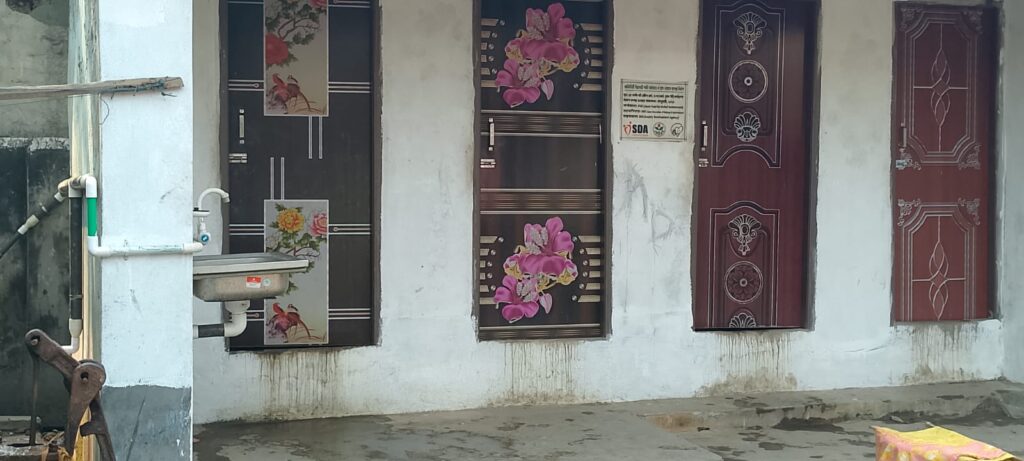
5. “Contingency partnership – Humanitarian Cash Transfer (HCT) in Flood and/or Cyclone affected areas in Barisal Region” (Supported by UNICEF-SPEAR)
Project in Brief:
SDA is implementing Humanitarian emergency project titled ‘‘Humanitarian Cash Transfer (HCT) in Flood and/or Cyclone affected areas in Barisal Region (HCT) with direct partnership aspect as well competitive process with award winning manner. Funded by UNICEF Bangladesh, SPEAR Section to address emergency direct cash support disaster affected community especially pregnant women.
Project Rational:
Tropical cyclones and tidal surge hit almost every year in Bangladesh’s coastal regions, creating a harsh reality on its community. According to the ACTT Nexus Strategy (2021-25), with about 720km of coast line (20% of land mass in coastal areas) a large part of Bangladesh is highly vulnerable to cyclonic storm, and 11 Districts are at high risk and of them Barguna, Barishal, Bhola& Patuakhali are in high risk areas as well river surrounding Pirojpur and Jhalokathi are also same. During cyclone, tidal surge also make these areas community more vulnerable especially children and aged community. Between1877 to 2017, 154 and more cyclones affected Bangladesh, of them, 55 cyclone found severe those affected almost all the community affected. According to the Bangladesh Environment statistics (BBS 2020) shows the evidence from 1582 to 2020 years, brings with 88 tropical cyclones hit the country. It incurred an estimated damage of $1.7 billion in the coastal area including Barisal division which is 2.6% of total GDP. Being the harsh affected disaster cyclone and flood the silent sufferer of climate change, the community, especially vulnerable children 0-4 years and their family of southern Bangladesh is worthy to receive survival and life-saving support without any preconception. Though it is found emergency need are met through relief support but the hard-core poor families who have children and pregnant or lactating mother need special care to meet their long term at least 03 months nutritional and hygiene kit to keep them safe and healthy. If direct cash support may provide them, they may survive with dignity, healthy and safe social environment.
Our implementation strategy
The project addressed cyclone and flood-affected 500 children of 0-4, pregnant and lactating mothers of vulnerable families under selected districts. As our proposed problem is a) to serve cyclone and flood-affected communities with Humanitarian Cash Transfer (HCT) focusing a) purchasing of nutritional foods and b) meet other household need for pregnant and lactating mothers nutritional and hygiene care and disabled children-related care. It is also mentionable that as part of the anticipatory action against flood or cyclone, we can operate/ implement beneficiary data collection, verification, data analysis, cash transfer, etc. subject to the availability of funds, consultation between partners, and UNICEF management for the betterment of affected people. Following the Technical Guidance of UNICEF, community or beneficiary-centered and participatory strategy and community-led approach and methods will be used in these program initiatives following HACT of United Nation (UN) will be followed without any fail. In the purpose of HACT, the following identification of the Mobile owner must be the children’s parents and legal guardians as well as the pregnant Mother herself will be the mobile owner.
Major Focus of the project:
Under this program, SDA will implement activities to support the community through anticipatory actions (pre-disaster response based on the national emergency trigger) and rapid response against floods or cyclones. For anticipatory action, based on the national emergency trigger, SDA will perform the following activities:
- Beneficiary identification and registration, 2.Beneficiary database analysis and preservation, 3.Community mobilization, consultation, and coordination with stakeholders and Grievance redress, post-distribution monitoring and analysis For the emergency response to cyclones and/or floods (post-disaster response), the scope of work from SDA will includes as Rapid situation analysis, Beneficiary selection, list preparation and registration, Post-distribution monitoring, Grievance redress system.
For Anticipatory responses, beneficiary data will be collected, verified and registered in 72 hours so that emergency cash support can be provided while for emergency response, situation analysis report will be shared within 48 hours of the notification received from UNICEF. SDA will also provide a market analysis report within the mentioned time period. After that, the beneficiary will be selected according to the inclusion criteria provided by UNICEF. SDA will collect the beneficiary information using the KBO toolbox and store the data in Microsoft Excel format. The local community’s influential people and local political leaders must be involved in the beneficiary selection to ensure community participation.
While the cash transfer will be conducted by UNICEF, the SDA will provide post-distribution monitoring and Grievance Redress System support. The community feedback will be divided into two criteria, one is whether they are receiving money, and another is the complaints related to fraud and corruption. The GRS support will be provided according to SDA GRM policy aligning with UNICEF advice.
We believe through our proposed interventions, change will happen, real worthy will receive the very essential money for children’s nutritional and caring expenses that they lost during disaster and pregnant mother will get nutritional and hygiene material that ultimately safe their unborn child from unexpected difficulties. Sharing a guideline of using the cash will be shared the group through interactive way, as well, visual in their quick observation and may do accordingly.
Cyclone-affected people will benefit from the emergency humanitarian cash transfer program which is a Multi-purpose Cash Allowance. This cash allowance will benefit the cyclone/flood-affected population by giving access to nutritious food, clean water, hygiene items, clothing, transport costs to access school, health/nutrition services, fuel etc. The vulnerable people who don’t have safe water drinking, improved sanitation facilities access, and good individual and collective hygiene practices will benefit from this emergency support. In addition, the activities will mitigate risks to other resources and facilities in the flood-affected communities. Unhygienic WASH facilities impose high health risks and undermine the dignity during and after the emergency, disproportionately of children, women, and people with disabilities. Hygiene items will also be given as a special priority issue for the respective age groups. Nutrition is often overlooked during emergencies, though people are at higher risk of under-nutrition and micronutrient deficiencies during the emergency, particularly women and children, pregnant women, and lactating mothers. This Multi-purpose Cash Allowance support also ensures nutritious food for the flood-affected people.
SDA ensured the full response by engaging Project staff and supporting the other key staff working in the head office for better planning, implementation, monitoring, and coordination
Achievement in the year 2024:
- Pregnant Mothers Data Collection-11721 mother
- Cash Transfer through Bkash-3209 family
- UP Consultation Meeting 34
- Community awareness meeting -280
- Working Coverage for this year- 03 Districts, 07 Sub-districts, Most Vulnerable UP-34 ( Patuakhali, Bhola and Barguna District)
Program Pictures:
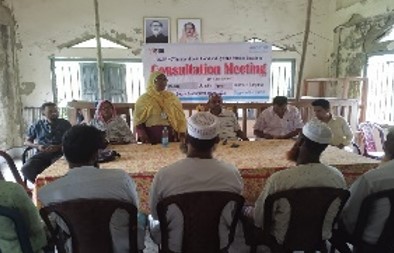
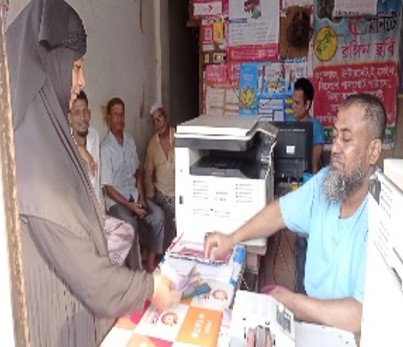
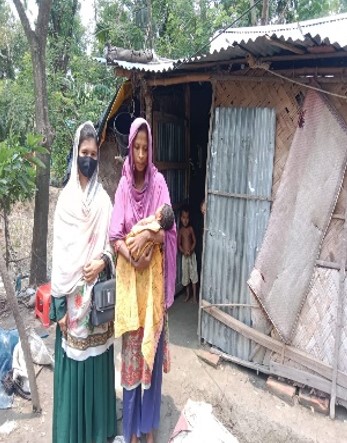
6. Influence schools and sub-national and national decision makers towards a more gender-responsive, climate-resilient, and digitally-oriented secondary education environment in Bangladesh, Project (supported by CAMPE/ MALALA FOUND)
Project Brief:
Being a field level implementing partner of CAMPE, SDA is implementing this small but effective education advocacy program at remote school level focusing more gender-responsive, climate-resilient, and digitally-oriented secondary education environment in Bangladesh with a view to influence national decision makers for educational environment development related decisions.
Background of the project: Malala Fund supported and implemented by CAMPE and its advocacy initiatives field level strong connection the program is implemented in 4 Secondary Schools of Kalapara Sub-districts. Based on SDG4: “Ensuring inclusive and equitable quality education and promoting lifelong learning opportunities for all, aiming to provide children and young people with quality and easy access to education” is the main focus of this program. Following this SDG Bangladesh improved a lot in education sector using appropriate strategies, timely initiatives jointly by Govt. and Non-govt. entities but lots of challenges also exists in this sector; specially the backward and marginalized students, where gender and climate resilient national policy implementation is a demand of time. Gender responsive identification, socio-economic conditions of families and climate sustainability are in high concern and in participation in education and building human capacity has various diversity.
To overcome these challenges, enhance Civil Society’s advocacy initiatives is one of the major objectives of this program. In many developing countries, Malala fund supports to build ‘Education Champion Network’, so that through joint action, girls education could be enhanced and Bangladesh also incorporated with this initiative. In this regard, three special areas are given priority as Haor (Wetland), Coastal and River erosion areas of Bangladesh. In these areas Girls education are badly impacted by disaster and environmental degradation. As well during nCOVID 19, around 18 months or two years general academic process hampered. Though government started alternative education through television and online zoom, radio and mobile communications, but the mentioned areas student deprived from these opportunities due to lack of facilities especially equipment and electricity. To make up this loss, the education champion network, introduces this more gender-responsive, climate-resilient, and digitally-oriented secondary education environment policy activities for women empowerment.
Under this program, encourage both boys and girls participation, providing ideas on global citizenship, improving standards, study environment, cultural diversity, gender parity, human rights, peace and resilience, climate change, sustainable environment, living with ease and continuous development, sustainable consuming and production and encourage to express the need. Alongside these, equity in education and accessibility standard and relevancy, financing and governance; over all enhance life skill for youth empowerment and under co-education, debate club, environment club formation and strengthen. Community engagement is a must to find the real need and information base decision making process and national level advocacy initiative where grass-root need issue capacity development also done.
Major Activities:
As a part of the program, 04 Secondary School with communities of Kalapara sub-district will be incorporated – a. community based- child marriage prevention and under Back to School Campaign organized for Learning continuation. b. In District/Sub-district level- Dialogue with local stakeholders on child marriage, child labor, disability and SRHR. Organized local level Education budget- specially, gender budget in education budget related sharing session. c. School based:
- Girls problem (Accessibility, child marriage, ICT, Security and SRHR) focused debate club formation.
- School base environment club formation and strengthen focusing climate change and prevention of VAW during disaster;
- Encourage Secondary level students to be part of UP & UZ level volunteer role in respective DMCs;
- IEC materials (before, on and post disaster) on Emergency signals and response system develop and dissemination.
Achievements in Short:
- Education budget Sharing event -01,
- Sharing Session on SRHR,
- Issue based debate club-04,
- Environment Club-04 and
- Child Marriage and VAW prevention Rally-01
Program Pictures:

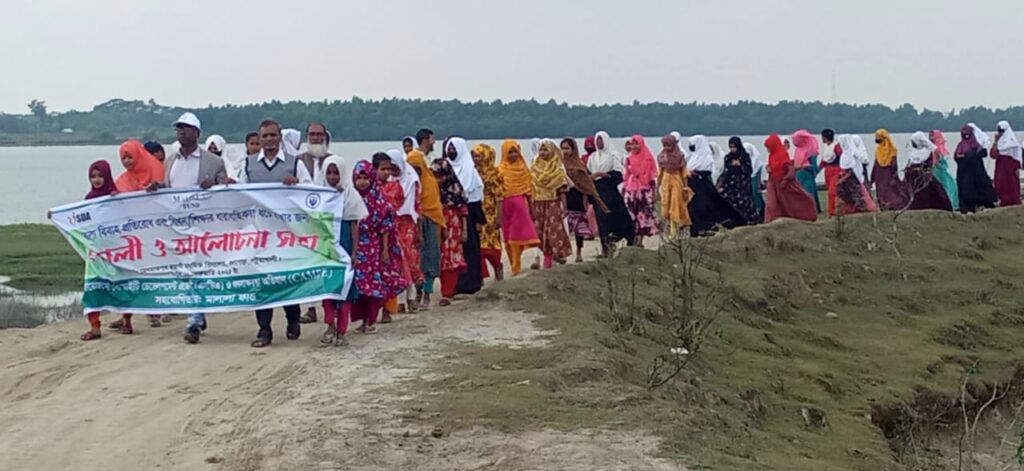
7. Supported Cyclone REMAL Affected Communities in South-West Coast, Bangladesh Project
Project In Brief:
Society Development Agency (SDA) is a well-known regional, progressive coastal based and District LEAD non-governmental organization established in 1996, working with the poor and marginalized people for their empowerment through improving their situation by creating access to quality life. The organization always puts its all-out efforts to address the emerging needs of the working communities pushed by a changing global context and collaborates with various local, national and international NGOs, CSOs, and government departments in realizing their common goal of poverty eradication and social development. SDA is committed to participate in and promote national development through upgrading the socio economic condition and promoting and protecting the rights of the disadvantaged, deprived backward and poor communities of the society. Under its 07 thematic areas, the organization focus first in the Humanitarian Response Program as well Disaster livelihood and food security thematic areas covering the most marginalized climate vulnerable communities of Southern Coastal Bangladesh. Through the partnership of NERA- NAHAB as well under the true leadership of DWS, SDA has taken this humanitarian assistance program to address the devastating REMAL response following NEAR Change Fund’s assistance and guidelines.
Rational:
Barobighai is a remote area of Patuakhali Sadar Upazilla (Sub-district) Surrounded and covered by mega Payra River and Barunbaria rivers. Basically fishing of forefathers and its continuation constitutes this locality, and later on communication through launch to Sadar Upazilla and districts develop this civilization. Harsh fact is connecting through road is very much difficult but now improving little by little. River is like their mother, so majors are fishermen and traditional farmer besides small local level business also changes their lives. Due to the middle of big rivers disaster was a common phenomenon here and the last devastated REMAL destroys a lot to this community with harsh reality.
Major Post Disaster Response/Support Work in 2024:
- Project Inception at Upazilla Level-01
- Pond reservation and re-excavation & disinfection- 01 No
- Tube-well repair, re-functioning, accessible, and plinth raise-30 No.
- Household Latrine-Installment & plinth raise=40 No.
- Conditional Cash Grant for house repair & support for Homestead Gardening=50 No.
- Cash support to the affected fisheries, livestock & poultry for livelihood restoration of the affected people=25 family
- Tree plantation with fencing at school cum shelters=03 Schools.
Program Pictures:
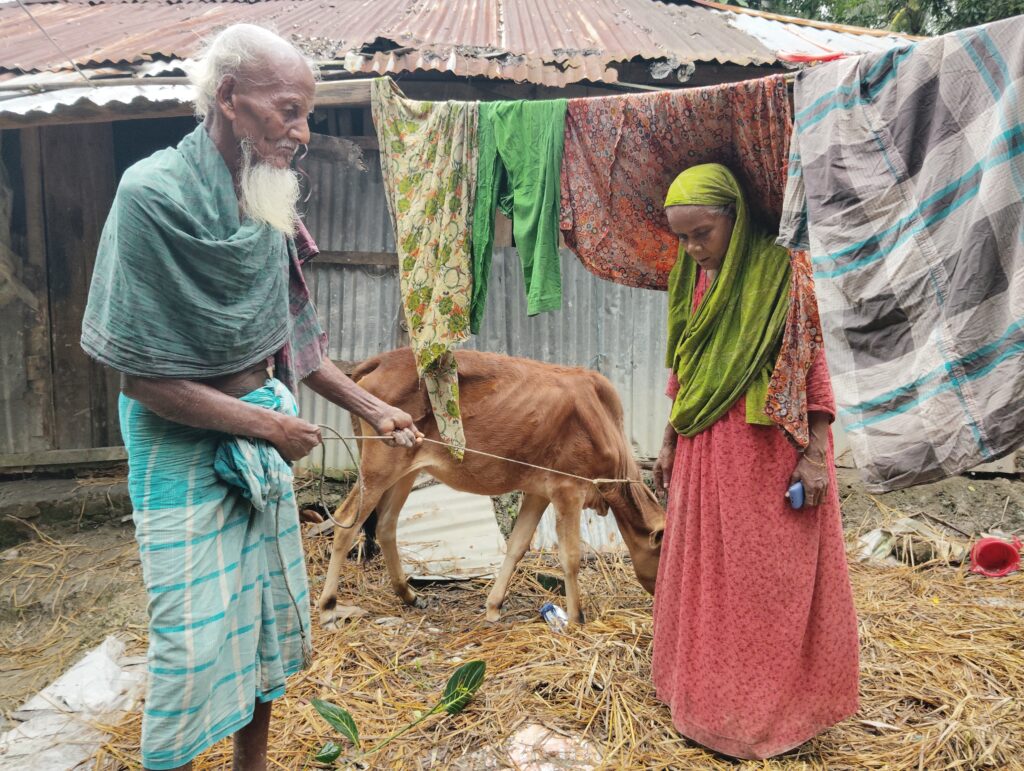
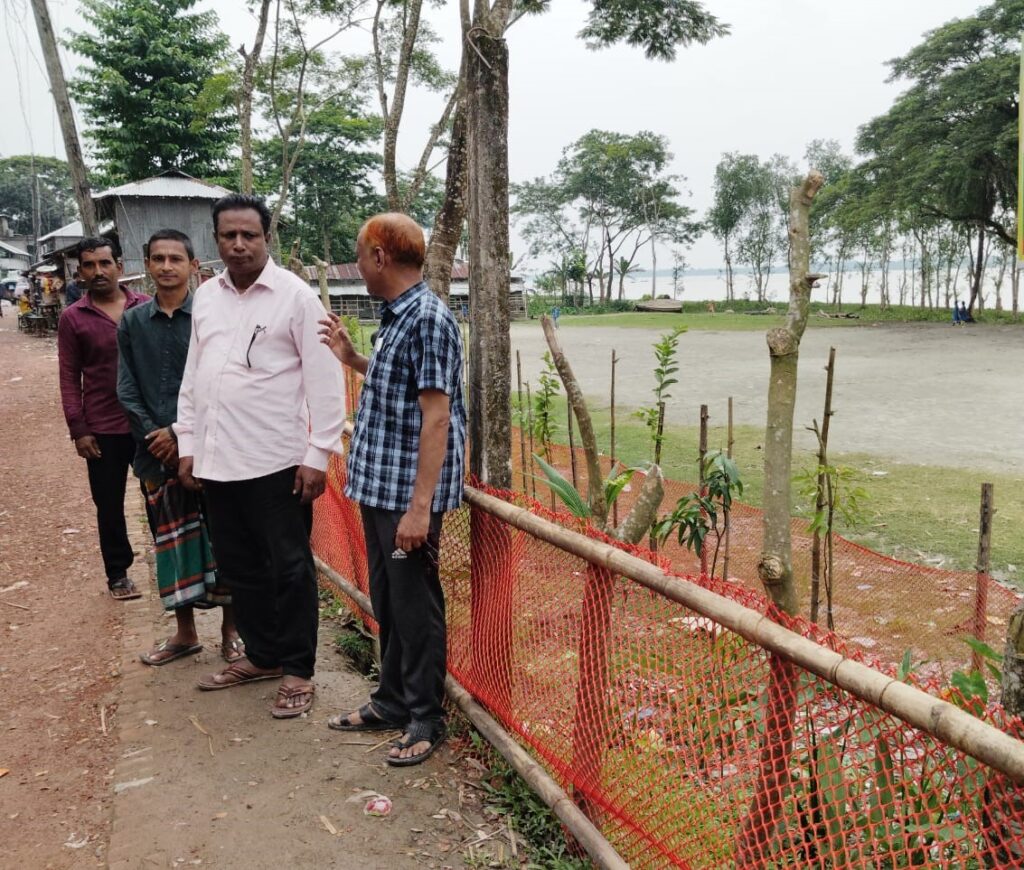
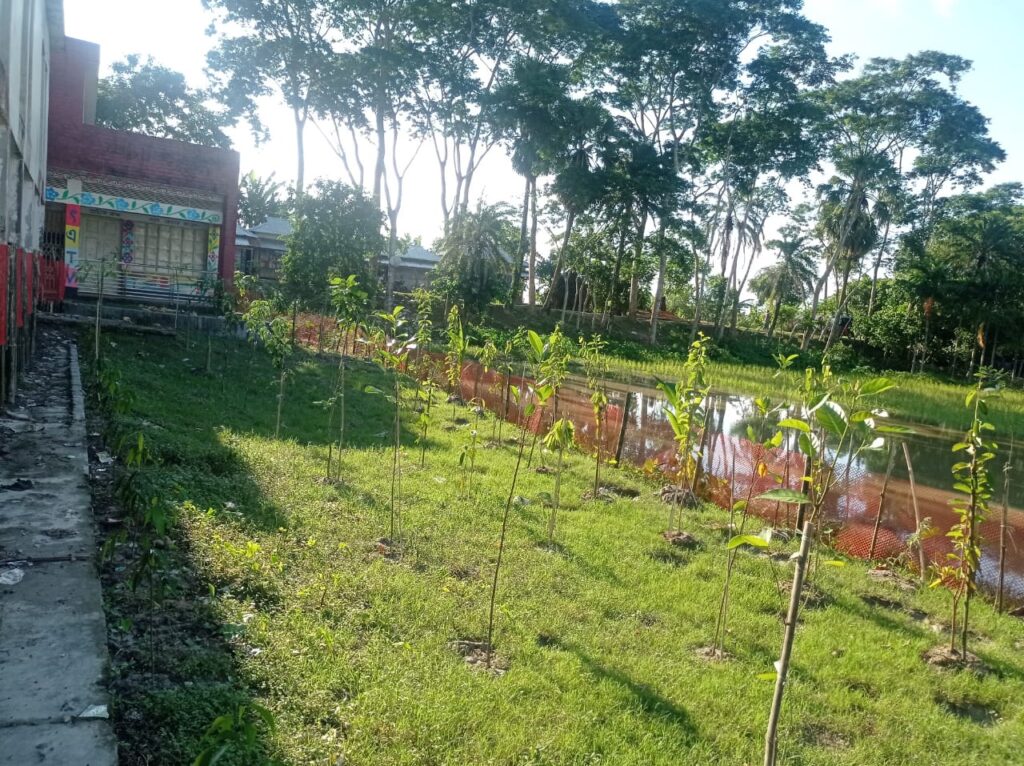
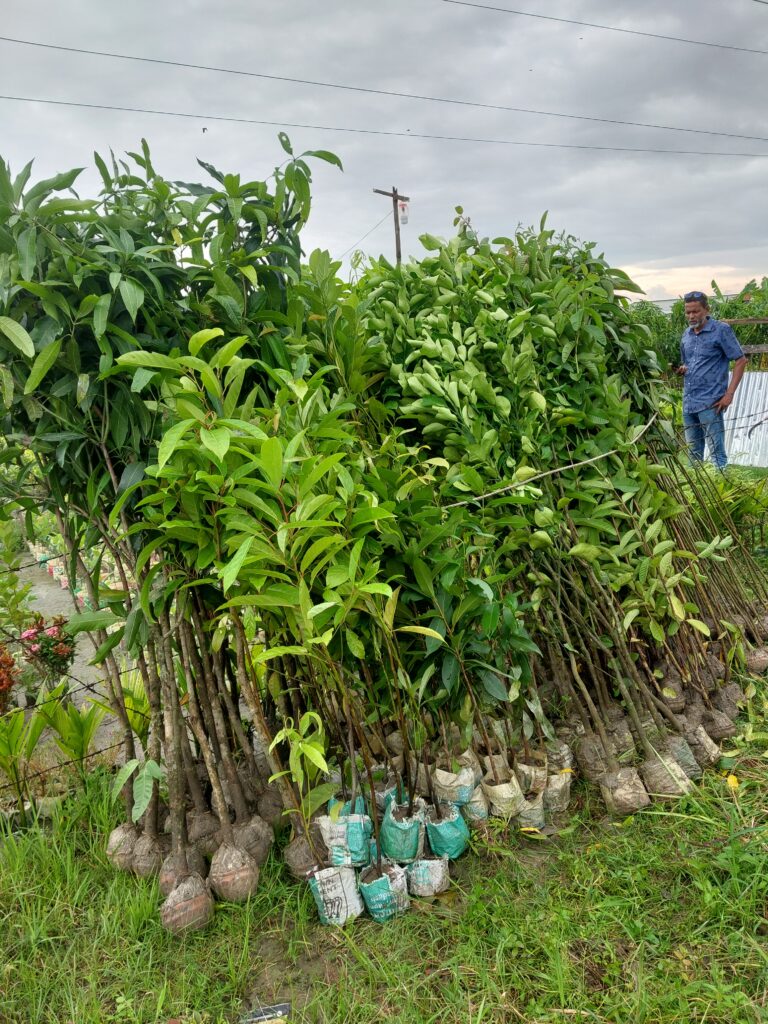
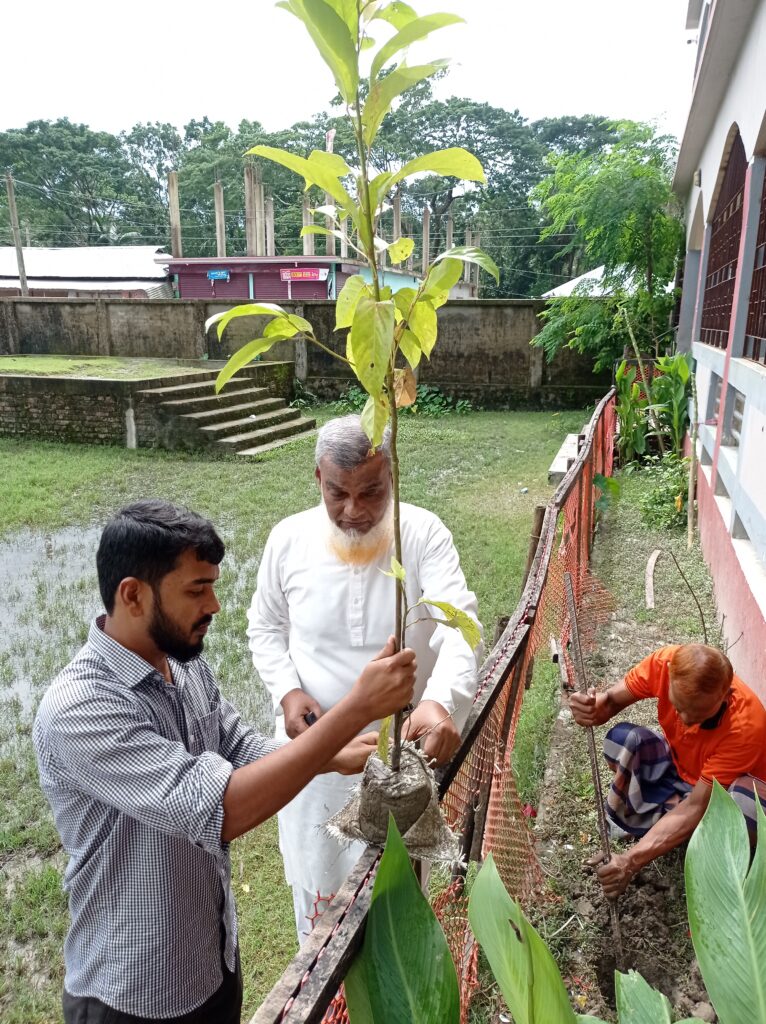
8. Partnership for Improved RMNCAH in Coastal Bangladesh
Project Background:
Bangladesh has achieved a lot in health sector to achieve the SDGs especially on Health Development. Though success is more but regarding some health indicators aspect advancement was sloth and need to address immediately. There is not much improvement regarding maternal and child mortality rate issues, if this goes slow then it will be difficult to achieve the expected goal regarding SDG. Though economic development is increasing but budget is very less regarding health services in local level. Bangladesh is the only country whose budget is decreasing day by day is an alarming for grass-root health issue. Though maternal mortality rate is alarming and community level health infrastructure not up to date and accessible in some cases. The program aims to address this through community partnership, awareness building, and infrastructure repair or maintenance support, those are mostly climate vulnerable and fragile.
RMNCAH project aims to improve climate change vulnerable communities in Patuakhali district’s Galachipa upazila and Barguna district’s Amtoli and Taltoli upazila where reproductive, maternal, and neonatal, child and health will be addressed. Approximately half a million people will be benefited in the 26 unions of said clustered areas. In this 26 unions the project will support 95 Community Clinics (CC), 15 Union Health and Family Welfare Centers (UH&FWC) with seven Sub Centers. This area is always at high risks of natural disaster and climate change. This project will support this areas communities by improved health seeking behavior and accessibility. To achieve this project’s goal a Sexual, Reproductive and Health Rights (SRHR) training had been organized to train the project staffs of SDA who is one the project implementing partners of Concern Worldwide.
The Goal of the project is to-Facilitate lasting improvements in reproductive, maternal, neonatal, child and adolescent health (RMNCAH) outcomes among climate-affected communities through effective community engagement, coordination and partnership. The expected outcomes of the project is –
- Climate vulnerable communities experience improved RMNCAH outcomes
- Public health system is increasingly locally led and resilient to shocks
The objectives of the project are-
- Increased access to and utilization of quality, equitable RMNCAH services by women and their children – all year, any time of year
- Community engagement (by & with community groups, civil society, etc.) in government health systems strengthens access to and quality of RMNCAH services for the most vulnerable
- Equitable local partnerships improve the quality, reach, and sustainability of locally-led health programming
Major Activities of the project are-
*Conduct Health Education Session by Field Facilitator with women on health issues (focusing Family Planning, ANC, PNC, EBF, EIBF, WASH, EPI, GMP, Common diseases, Health seeking), gender rights, power relation, decision making, care work burden, gender division of labor, GBV, child marriage *HH visit by Health Volunteers to the houses having pregnant women, lactating mothers with under 6 months children and children aged 6-23 months*Conduct awareness session with men on family planning, SRHR, risk of early pregnancy, gender rights, power relations, decision-making, care work burden, gender division of labor, GBV, child marriage*Conduct sessions with adolescent boys and girls separately on adolescent health issues specially SRHR by School Teachers*Provision of awareness message dissemination through audio-visual media in Union Health and Family Welfare Center C13:C20*Provision of awareness message dissemination through audio-visual media in Union Health and Family Welfare Center C13:C20*Implementation of community action plans for Community Clinics (facility renovations, infrastructure, medical equipment, installation of citizen charter, IEC board, and logistic support)*Provide scholarship to local women students to become a qualified midwife to provide RMNCAH services*Training on monitoring, supervision, data analysis and interpretation for first and second line supervisors of H&FP department, Upazilla administration and local government.
Achievement of the project in 2024: Health Education Session-3985, Household Visit-16021, Awareness session (Men) -3015, Conduct SRHR Session in School by school teacher-688, Community Action plan-37 (CC base) & 11 (UHFPO)
Program Pictures:
